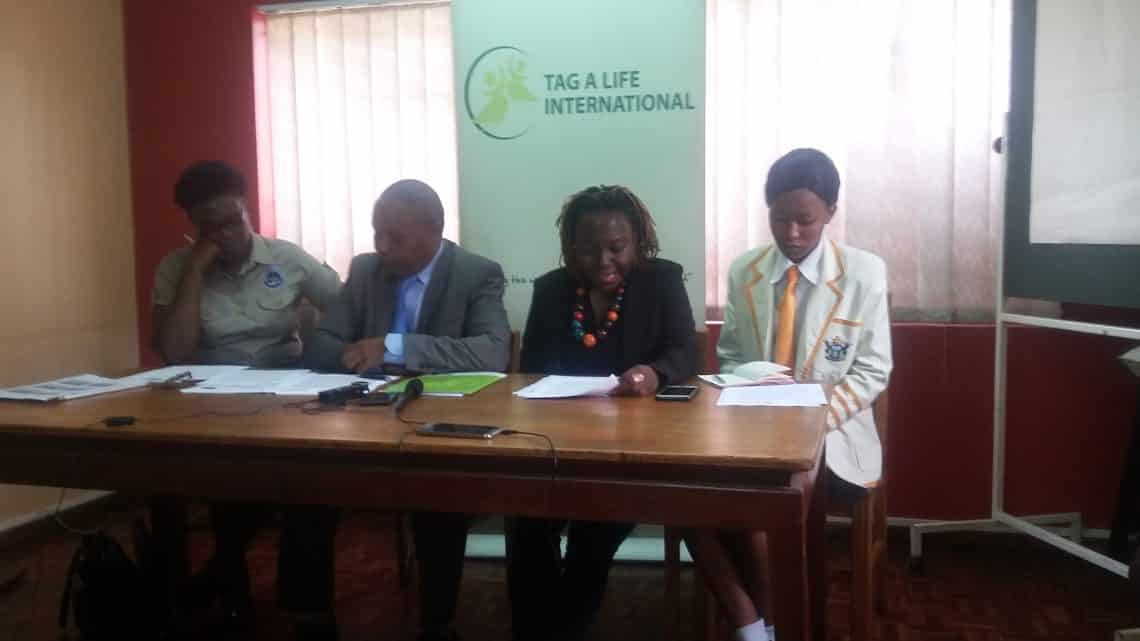By Byron Mutingwende
The failure to pay fees should not be an excuse for keeping children out of primary school, civil society otganisations (CSOs) have said.
Speaking to journalists in Harare on Thursday 14 December 2017, a consortium of CSOs advocating for the rights of children took a dig at the government for neglecting its duty of providing basic education for all regardless of social, political and economic circumstances.
“Tag a Life International (TaLI), a Girls and young women’s rights organisation in a partnership with Zimbabwe National Council for the Welfare of Children (ZNCWC), Women’s Coalition of Zimbabwe (WCoZ), Forum for African Women Educationalists Zimbabwe (FAWEZI), Mambure Trust, Research Advocacy Unit(RAU), Higher Life Foundation(HLF), Education Coalition of Zimbabwe (ECOZI), Justice for Children’s Trust (JCT), Katswe Sisterhood, World Vision Zimbabwe, Evangelical Fellowship of Zimbabwe (EFZ), Issues Pane Nyaya, UDACIZA, Female Students Nrtwort (FSNT), Zimbabwe Alliance, PROWEB, and other civil society and religious organisations are hereby launching the Every child In School (ECIS) Campaign calling on the government of Zimbabwe to urgently restore the legacy of education in Zimbabwe by allowing the hundreds of thousands of marginalised children who are out of primary school, owing to a number of reasons chief among them inability by parents or guardians to pay the required school fees when they are looking for places to enrol their children.
“We are asking for the Minister of education to release a circular to this effect immediately so that those children who are out of primary school because they could not pay the required school fees can be given places in public schools and not be discriminated against because they cant pay. These children should have access by the second week of January 2018 when all schools open,” said Nyaradzo Mashayamombe, the TaLI Director.
The ECIS platform commended President Emmeson Mnangagwa who, in his inaugural speech, stipulated that all the activities that the national security institutions aim to achieve in the new trajectory must be focused on overall human security from disease, hunger, unemployment, illiteracy and extreme poverty.
Zimbabweans were commended for maintain peace and order during the processes of transition because of their high levels of education. The CSOs warned that there was a risk of having a whole generation of uneducated people owing to the deterioration of the education system and the unavailability of access to free education in the current dispensation, a situation that is against the human rights of children.
The ECIS initiative said it understands that education is a compulsory right in Zimbabwe, and that every child has the right to attain basic education according to Zimbabwe’s constitution section 75.
The ECIS campaign concretes upon frameworks set by the Convention on the Rights of the Child purport: the best interests of the child, protection of rights, social security, access to information, survival and development, asserted in Article 4. Zimbabwe ratified this convention a long time ago.
“We highlight the Zimbabwe Constitution which, in section 75(a), stipulates that the State must take all practical measures to promote a basic-state funded and compulsory education for children. The State is also expected “to take reasonable legislation and other measures, within the limits of the resources available to it, to achieve the progressive realization of the right set out” (Constitution of Zimbabwe Amendment (No. 20) Act, 2013. We however note that it remains a fundamental and un-negotiated right for all these children who are out of school to be given a chance at education, just like those who are within the schools are protected by existing policies. The state has left this responsibility to the evidently struggling parents and guardians who constitute the more than 90% formal unemployment in return children are not enrolled in school,” Mashayamombe said.
The CSOs were concerned by the socio-economic challenges such as the high rate of child marriages, child labour, trans-generational poverty and the current numbers of failure of enrolment of many living below the poverty line those failing to stay in school.
According to research every year, more than a million school age children are at the risk of either dropping out of school or not enrolling at all. 6.6% of primary and 20.6% of secondary school children were not in school in 2014 (Child labour Survey 2014), and 68% of these children failed to enrolß in school due to financial reasons leading to 23.3% failing to complete primary education whilst 58% were just demotivated to enrol, probably due to the same reasons (MoPSE Education Sector Strategic Plan 2016-2020).
The Zimbabwean government has been facilitating state-funded education in accordance to its mandate in the Education policy. However many children have failed to access it, and on record, more than 350 000 pupils failed to access facilities such as BEAM owing to bureaucratic incompetence (The Herald newspaper 17 March 2015).
Chinga Govhati, a prohgramme Officer with the Justice for Children alluded to Section 19, which talks about access to appropriate education and training, Section 27 on the role of the state in ensuring compulsory basic education and Section 5 of the Constitution of Zimbabwe.
“However, then section on giving the duty on paying school fees to parents needs to be revisited because we have many child-headed families in Zimbabwe. In that case, the state should be the primary duty-bearer. It means all of us – parents, schools and the state have a duty to ensure all children are in school,” Govhati said.
Reverend Taylor Nyanhete, the Director of the Zimbabwe National Council for the Welfare of Children (ZNCWC) urged the government to increase iots support to safety programmes like the Basic Education Assistance module (BEAM) to assist children from disadvantaged backgrounds to attain basic education.
“In lobbying for the government to ensure children are given basic access to education, we should engage Parliamentarians, the Executive and CSOs. It’s our collective duty,” Nyanhete said.
